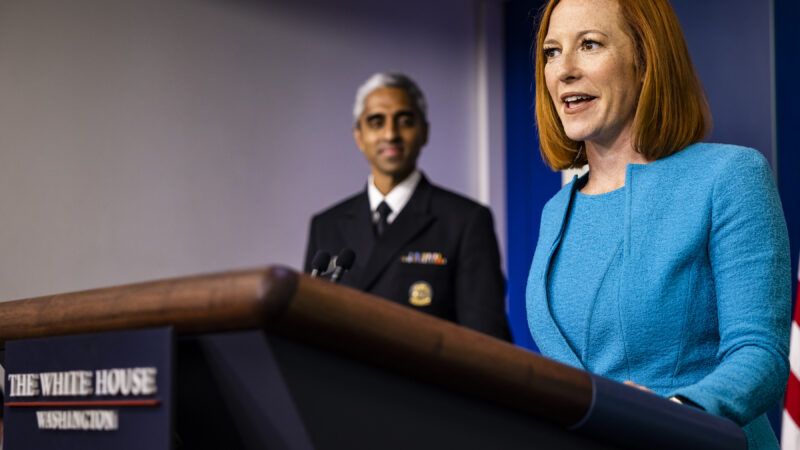The Government Should Stop Telling Facebook To Suppress COVID-19 'Misinformation'
White House Press Secretary Jen Psaki wants the social media site to ban 12 specific anti-vaccine accounts.

The federal government is stepping up its effort to purge the internet of COVID-19 "misinformation." On Thursday, White House Press Secretary Jen Psaki singled out a dozen specific anti-vaccine Facebook accounts and called on the platform to ban them.
"There's about 12 people who are producing 65 percent of vaccine misinformation on social media platforms," said Psaki. "All of them remain active on Facebook, despite some even being banned on other platforms, including ones that Facebook owns."
She was discussing a Department of Health and Human Services (HHS) report on "confronting health misinformation." It instructs social media platforms to redesign their algorithms so that false information about COVID-19 is deprioritized, to shield journalists and medical professionals from harassment, and even to address misinformation during livestreams, a task that the report admits is "difficult" given the streams' "temporary nature and use of audio and video."
"We all have the power and responsibility to confront health misinformation," tweeted Surgeon General Vivek Murthy. "That's why we included recommendations for individuals, educators, researchers, health professionals, tech companies, and more."
The federal government is not explicitly ordering tech platforms to take down content. These dictates are essentially strongly-worded suggestions. But you're forgiven if you think Psaki's summary of the report sounded like a command.
"Facebook needs to move more quickly to remove harmful, violative posts," she said. "Posts that would be within their policy for removal often remain up for days, and that's too long. The information spreads too quickly."
Psaki was alluding to anti-vaccine content, though the report itself impugns "medical misinformation" more broadly. Of course, the government itself has spread plenty of "medical misinformation," from the early bad guidance on masks to White House coronavirus czar Anthony Fauci's deliberate misstatements about the herd immunity threshold. For months, government health officials treated the lab leak theory of COVID-19's origins as a wild conspiracy theory, and Facebook followed suit: It vigorously censored content that promoted the lab leak theory. That policy was not revised until June.
Efforts by the government and tech platforms to suppress misinformation have undeniably resulted sometimes in the suppression of information that is either factual, or could plausibly turn out to be factual. (This has been the case outside the realm of pandemic-related content as well.) New initiatives undertaken by the federal government that would encourage Facebook to be even more heavy-handed with potential misinformation should be met with skepticism: The track record is just not very encouraging.
The White House's targeting of Facebook should make critics a little sympathetic to Mark Zuckerberg's position. Prominent legislators from both political parties—as well as the current and former presidents—want to aggressively regulate his company if not break it apart entirely. Facebook's CEO must feel tremendous pressure to give federal health bureacrats exactly what they're asking for, or else.
Instead of defending the rights of private companies to set their own moderation policies independent of whatever the government would like them to do, Republicans are taking this opportunity to further erode Facebook's autonomy. Sen. Josh Hawley (R–Mo.) even suggested that the site's submission to the feds renders it an agent of the state.
"The social media platforms are increasingly just arms of the federal government and the Biden White House," Hawley tweeted. "Why should the #BigTech companies continue to be treated as private companies when they function as agencies of the federal government."
Hawley is essentially saying that a private company complying with the government becomes a state actor, and thus should be bound to the same restrictions as any other public agency. (Former President Donald Trump's doomed social media lawsuits rest on a version of this argument.) But Hawley and others are also attempting to punish these same private companies for not doing what the White House wants. (In Hawley's case, he wants Facebook to suppress fewer posts.) That's quite a Catch-22: Facebook is in trouble either way.


Show Comments (503)